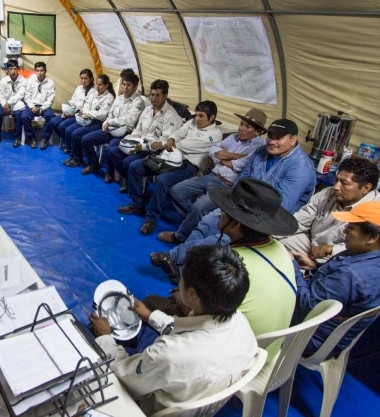Suppliers and contractors
Ensuring our suppliers and contractors respect our human rights policies
We build strong relationships with our supply chain and we require compliance with internationally recognized standards, such as the provisions on safety, the environment, ethical behavior, and respect for human rights that are currently in force in our internal regulations.
We ensure that our suppliers, contractors, and distributors' behavior is aligned with our commitments through the following processes:
- Selection
- Assessment
- Control
For that, we include clauses in contracts with our partners and contractors, and we carry out social audits to promote compliance with our principles and commitments with partners, while encouraging them to reach our standards through awareness-raising activities.
One example is the success story of our communication of the Human Rights policy to our contractors in Bolivia.
An example of how our policy is disseminated in Bolivia

The Bolivia Business Unit carries out regular awareness-raising activities among contractors and communities about human rights, and in particular, about the commitments of our Human Rights Policy and our relationships with the communities.
Contractor awareness-raising is part of the contracting specifications and is extended to all companies that participate in the bidding process for projects executed in the field.
Contractor training is carried out as a mitigation measure due to a concern related to the grievance mechanism implemented at the operational level. The majority of the complaints received come from our contractors. This awareness-raising helps reduce human rights-related incidents and contributes to raising the performance standards of our contractors, who as a result become aware of the importance of complying with certain guidelines aimed at the sustainability of the projects they execute in the field.
On a regular basis, our employees, nearby communities, partners, civil society institutions, and all contractor companies that join our operations receive awareness training in order to continue integrating the commitments of this Policy in our day-to-day activities. Additionally, it reinforces awareness of our operational-level grievance mechanism, which was implemented in 2011 to ensure that claims, complaints, and non-conformities are properly handled.
Responsible management of suppliers and contractors
Responsible supply chain management is essential for preventing and mitigating risks. It brings specific risks to light and is linked to job creation and the development of the local economy in the communities where we operate. We establish control levels and a system to help us ensure that our suppliers and contractors always act in line with our commitments.
1. The Code of Ethics and Business Conduct for Suppliers (PDF l 2.3 MB) includes rights such as the rejection of child labor, rejection of forced labor, freedom of association, and the right to collective bargaining. All of the companies that maintain a contractual relationship with us have to respect this code. We work to ensure that our relationships with more than 4,500 suppliers are sound. We build relationships based on integrity and mutual respect and trust, in addition to the quality of the products and services they offer us.
2. Repsol's General Conditions for Procurement and Contracting (PDF l 531 KB) in the calls for proposals and tenders and in the auditing and qualification questionnaires are used to regulate the relationship between the company and suppliers. All of the requirements we have for our contractors also apply to subcontractors, including a specific clause on sustainability.
3. The evaluation of our suppliers identifies the economic, technical, social, ethical or environmental risks at the different stages of the established business relationship. We are constantly thinking about how to contribute to the economic development of the places where we operate, especially through the local suppliers we contract. That's why we use different supplier management tools throughout the procurement process:
- The qualification process aims to mitigate the risks that can arise from the various links in the supply chain by identifying critical suppliers and ensuring they are able to supply the different goods and services responsibly and analyzing business, financial, and technical aspects, in addition to aspects related to management systems that apply to safety and environment and quality; and aspects related to ethics and human rights. This process may be conducted in greater or lesser detail depending on the monetary amount and the possible risk or impact the procurement or contracting may have in terms of safety, environment, ethical behavior, and respect for human rights.
- We perform qualification audits to verify the information provided by suppliers during the rating process. The more critical the supplier is in terms of the type of good or service it provides or the place where it is manufactured or provided, the deeper the analyze of the different issues or the place in which it is manufactured or provided. As a general rule, in rating audits, we mainly review the quality, safety, and environmental management systems, in addition to the code of ethics, respect for human rights, labor practices, and measures against fraud and corruption, verifying that the information provided in the rating process is accurate. The social audits analyze the aspects covered by the rating audit in more detail, as well as the supplier or contractor's supply chain management.
- After the work has been performed, or while it is being performed, we assess the supplier's performance by analyzing their compliance with the required aspects related to management, quality, safety, environment, labor, ethics, and human rights. This assessment also helps to complete the information on the supplier or contractor during the re-rating process and serves to establish a systematic, documented process to follow in the assessment of suppliers and contractors.

